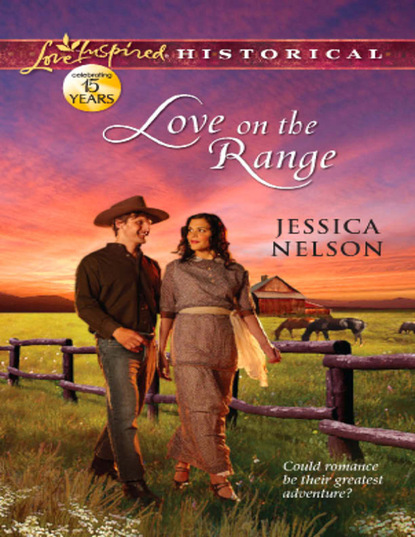
Полная версия
Lone Wolf's Lady

The Texan’s Dilemma
Bounty hunter Tom McCain works alone. He couldn’t save his childhood friend, but he’ll deliver her six-year-old daughter, Sarah Jane, to the only family she has left: a wealthy great-grandfather in Texas. But that means tangling with the fiery schoolteacher who wants to adopt her.
Katie O’Malley is determined to give Sarah Jane a fresh start away from the tragedy of her early life. Even the high-handed Mr. McCain can’t stop her. But when a secret from Sarah Jane’s past threatens the young girl’s life, joining forces with Tom is Katie’s only option. They’ll need all their courage to turn a perilous future into a home, a family—and a dream come true.
“What kind of husband would you like, Katie?”
A slow smile stretched across Tom’s face, sparking a glimmer in his eyes.
Katie stood tall and crossed her arms.
“I don’t want a husband at all.”
“Why not?” Tom scanned the length of her, then back again, as though assessing her.
Had he somehow found her lacking?
The momentary insecurity took Katie aback, and she chided herself. His opinion didn’t matter in the least.
“I don’t think there’s much chance you’ll need to worry about that.”
Heat rose to her cheeks. “What do you mean?”
Tom’s lighthearted smile faded. “You might be able to recite poetry or quote ancient philosophers, but I doubt you know enough to come in out of the rain. A man would have to be plain loco to consider asking for your hand. You’d argue even if obedience would save your own hide.”
Katie’s hands went to her hips. “And I suppose you think a woman would find you appealing?”
“You do….”
JUDY DUARTE
always knew there was a book inside her, but since English was her least favorite subject in school, she never considered herself a writer. An avid reader who enjoys a happy ending, Judy couldn’t shake the dream of creating a book of her own.
Her dream became a reality in March 2002, when Silhouette Special Edition released her first book, Cowboy Courage. Since then she has published more than twenty novels. Her stories have touched the hearts of readers around the world. And in July 2005 Judy won a prestigious Readers’ Choice Award for The Rich Man’s Son.
Judy makes her home near the beach in Southern California. When she’s not cooped up in her writing cave, she’s spending time with her somewhat enormous but delightfully close family.
Lone Wolf’s Lady
Judy Duarte

MILLS & BOON
Before you start reading, why not sign up?
Thank you for downloading this Mills & Boon book. If you want to hear about exclusive discounts, special offers and competitions, sign up to our email newsletter today!
SIGN ME UP!
Or simply visit
signup.millsandboon.co.uk
Mills & Boon emails are completely free to receive and you can unsubscribe at any time via the link in any email we send you.
Get rid of all bitterness, rage and anger, brawling and slander, along with every form of malice. Be kind and compassionate to one another, forgiving each other, just as in Christ God forgave you.
—Ephesians 4:31–32
To my editor, Susan Litman, for going above and beyond. Thank you for believing in me and this book.
Contents
Chapter One
Chapter Two
Chapter Three
Chapter Four
Chapter Five
Chapter Six
Chapter Seven
Chapter Eight
Chapter Nine
Chapter Ten
Chapter Eleven
Chapter Twelve
Chapter Thirteen
Chapter Fourteen
Chapter Fifteen
Chapter Sixteen
Chapter Seventeen
Epilogue
Excerpt
Chapter One
Summer, 1884
Pleasant Valley, Texas
“Caroline Graves is dead. And your job is done.”
Tom “Lone Wolf” McCain turned in his saddle, the leather creaking with his movement as he faced Trapper Jack, his crotchety old traveling companion. “She left a six-year-old daughter behind.”
“And the kid’s being raised by a woman who’s known her since she was born.” Trapper Jack lifted his battered hat and mopped his weathered brow with the dusty red flannel sleeve of the shirt he’d worn for the past several days. “What are you going to do? Uproot her?”
“If I have to.” As Tom met the man’s glare, he had to admit that when push came to shove, he wasn’t sure what he’d do. But he owed it to Caroline to see to it that her daughter was safe and well cared for.
If only Harrison Graves had hired Tom to find his granddaughter six months earlier, Caroline might have been alive when he’d followed her trail to Taylorsville. Then Tom would have had a chance to talk to her. He might have convinced her to go back where she belonged, to her grandfather’s ranch in Stillwater.
“You ought to just tell the old man that Caroline died,” Trapper added, as he surveyed the typical Texas town that lay nestled in the valley below. “And let that be the end of it.”
“Harrison Graves is looking for an heir.”
Trapper spit a wad of tobacco to the side. “Seems to me that Graves isn’t too fond of illegitimate heirs.”
Tom knew that better than anyone. And he’d given that some thought, too. After all, when Harrison had learned that his granddaughter was with child, he’d sent her to Mexico to have her baby, instructing her to leave it there. And he’d never mentioned anything to Tom about searching for the baby Caroline was supposed to have left behind in a Mexican orphanage—he’d only wanted his granddaughter back.
So how would the dying cattleman feel when Tom returned with Caroline’s illegitimate child in tow? Would that appease him? Would he rewrite his will, leaving everything to the little girl? Or would he insist that Tom leave her where he’d found her?
Maybe Trapper was right. Maybe Caroline’s daughter was better off not going back to Stillwater.
But was she better off being raised by a fallen woman?
From what Tom had gathered in Mexico, Caroline had run off with a former prostitute from Pleasant Valley. For the next few years, she’d managed to keep her friend on the straight and narrow—or so it seemed. But after Caroline had died, the woman had returned to the only other life she’d known, taking the child with her.
That might be true, but something didn’t sit right. In fact, a lot of things just didn’t add up.
“He could have hired any number of bounty hunters to search for his runaway granddaughter,” Trapper said. “Why’d it have to be you?”
Tom wasn’t sure why Harrison had summoned him, other than his reputation for being good at finding people who didn’t want to be found.
“That old man doesn’t deserve the time of day from you,” Trapper added. “Not after all he did to make your life miserable. I still can’t believe you’d even consider working for him.”
“I’m not doing this for Harrison Graves.” Nor was he doing it for the money. Yet when the wealthy cattleman had handed him the twenty-dollar gold piece, Tom had pocketed the coin rather than explain why he would have agreed to search for Caroline on principle alone.
Trapper chuffed. “I still think you’re making a big mistake, kid. And I’m not about to sit around and watch you make a fool of yourself. I’m going back to Hannah’s place. We’ve been away too long as it is.”
“No one asked you to come along in the first place, Trapper. In fact, if you recall, I tried to talk you out of it, but you insisted.”
“That’s only because someone’s got to look out for you, because no matter how much book learnin’ you’ve had, you ain’t got a thimbleful of common sense.”
Tom sighed and squinted into the afternoon sun. He owed a lot to Trapper. That was a fact. But sometimes the old man forced gratitude to the breaking point.
Trapper grumbled under his breath, then said, “You can’t blame me for worryin’ about you. I’ve been lookin’ after you ever since you was knee-high to a timber wolf.”
If truth be told, Tom had no idea where he’d be today if the old man hadn’t stumbled upon him about twenty miles outside of Stillwater when he’d been sick, starving and scared.
No, Tom owed his life to the man who hadn’t been afraid to take in an orphaned ten-year-old with mixed blood and treat him like the son he’d never had.
“Suit yourself,” Trapper said, turning his horse around.
Tom urged his mount forward, onto the road that ran down the hill, through the middle of town and continued along the boardwalk-lined main street, with its typical lineup of businesses—a good-size mercantile, a bank, a small laundry and a saloon.
His plan was to speak to the sheriff first. So he scanned both sides of the street, looking for the jail. He spotted it up ahead, next to the newspaper office, where, just outside the door, an attractive young woman with auburn hair pulled into a topknot studied the open periodical in her hand, her brow furrowed.
She was a pretty one, he noted. And curious, too. Otherwise, she would have waited to take the newspaper home to read it. He wondered what bit of news had caught her eye and held her interest.
Across the street, a group of boys snagged Tom’s attention as they gathered around a small girl, taunting her. Most people didn’t give much thought to childish squabbles, thinking that kids usually worked things out without adult interference. But Tom wasn’t so sure about that. Probably because, more often than not, he’d found himself on the wrong end of a fistfight meant to “teach that half-breed a lesson” when he’d been in school.
And something about this one didn’t seem right—or fair.
He pulled back on the reins and slowed his mount, just as a tall, towheaded kid shoved the little blonde girl into the dusty street.
Before he could turn his horse in the direction of the bullies, the woman on the boardwalk called out, “Silas Codwell! You ought to be ashamed of yourself.” Then she tucked the periodical she’d been reading under her arm and marched across the street in a huff.
The other boys froze, both startled and admonished by her arrival, but the ringleader, who was nearly twice the size of the girl, merely crossed his arms and shifted his weight to one hip.
The petite woman glared at the kid she’d called Silas as though she wanted to throttle him, and Tom knew just how she felt. He’d like to put a little fear of God into that one himself.
So he nudged his horse in the direction of the scuffle, ready to step in if the bully gave the redhead any trouble.
As if unfazed by Silas and his bluster, the lady bent to help the tiny heap of blue calico to her feet. “Are you all right, honey?”
The little girl, her bottom lip bloody and quivering, her light blue hair ribbons drooping from where they’d once adorned two blond braids, nodded.
Then the redhead turned to Silas, her eyes narrowed, her finger raised. “You’re nearly thirteen years old. Shoving a small girl into the street is brutal and inexcusable. Apologize this instant.”
The other boys began to edge away from her, but Silas only shrugged. “I don’t know why you’re so all fired—”
The redhead grabbed his ear and twisted until he cried out, “Ow! You aren’t our teacher anymore. You’d better let go of me or my father will—”
Clearly undeterred by his threat, the redhead twisted harder until the boy screeched out “I’m...sorry” in a long, drawn-out whine.
The lady, with her cheeks flushed and her eyes sparked with ire, released the boy’s ear, just as Tom’s shadow eclipsed them both.
Only then did Silas appear the least bit remorseful.
“You owe the lady and the child a real apology,” Tom said. “I saw what you did. There was no excuse for it, boy.”
Silas opened his mouth, as if he had something to say in his defense. Then, after his gaze locked on Tom’s, his stance relaxed and he relented. “I’m sorry, Miss O’Malley. It won’t happen again.”
The lady, apparently the schoolmarm at one time, stood as tall as her petite stature would allow. “See that it doesn’t.”
Silas nodded, then, after a quick glance at Tom, took off to join his friends.
Tom’s gaze turned to Miss O’Malley, whose rolled newspaper had fallen to the ground.
She glanced at it, but before reaching to pick it up, she said, “Thank you, Mr....?”
“McCain.”
She nodded, then released a pent-up sigh. “You’d never know it, but Silas’s father is the minister.”
“No, ma’am. You’re right. I would have expected his father to be the town drunkard. Or maybe to hear that he’d been locked up in jail for the past ten years.”
She clucked her tongue. “Silas has a mean, spiteful side to him that his parents refuse to see. I taught school here in Pleasant Valley up until last summer and watched that boy bully the other children many a time.” She bit down on her bottom lip, as if she might be wondering if she’d shared too much with a stranger.
Her hands rested on the little girl’s shoulders in a loving, protective manner.
Satisfied that the child was in good hands, Tom doffed his hat. “Good day, Miss O’Malley.”
Then he urged the gelding across the street and on to the sheriff’s office, where he planned to ask a couple of questions and get directions to a place known as the Gardener’s House.
He might look like an uneducated half-breed, but he knew better than to ask a lady where he could find the town brothel.
* * *
Katie O’Malley held on to Sarah Jane’s shoulders as she watched the dark-haired stranger ride away.
The man was frightfully handsome, with eyes the color of fine bourbon, high cheekbones and a square-cut chin. His copper-colored skin suggested he might have a mixed-Indian heritage. And for the first time in her life, she found herself more than a little awestruck by a man’s appearance, especially one who spent his days in a saddle.
Mr. McCain wasn’t the type of man she usually had reason to talk to—or the type she should find the least bit attractive. Yet she did.
She supposed that was because he’d come to her rescue, even though she hadn’t needed him to. She did, however, appreciate the gallant way he’d made the gesture.
He’d studied her in a curious way, which had caused her pause. Then he’d simply said, “Good day,” turned his mount and headed down the street.
She wondered what business he had in town. Unable to quell her curiosity, she watched him go until he stopped at the sheriff’s office, where he left his big bay gelding tied out in front.
When he was finally out of sight, Katie returned her attention to the disheveled little girl.
“What are you doing in town all by yourself?” Katie asked.
“Blossom gave me a penny, and I wanted to buy a peppermint stick. I was going to wait for someone to take me to the mercantile, but then Sweet Heather told me to go outside and stay out of the way.”
“Where’s Daisy?”
“She wasn’t feeling good, so she went to take a nap. But she’s probably in the kitchen now. It’s her turn to cook dinner.”
Katie pulled a lace-edged handkerchief from her reticule and placed it on the little girl’s small, bloodied lip, gently dabbing at the wound. She’d championed many causes in the past, but none had touched her heart as deeply as Sarah Jane Potts.
It was time once again to talk to Daisy and insist that the woman either agree to leave with Katie for Wyoming next week or that she allow Sarah Jane to go without her.
After adjusting the ribbons in the little girl’s hair, Katie took her by the hand. “Come on, honey. I’ll walk you home.”
While they made their way to the brothel at the far edge of town, they talked about important things, like why dogs chased cats and why staring into the sun made a person sneeze.
It hadn’t taken many chance visits with Sarah Jane for Katie to realize that she was an absolute delight, and the more time she spent with the charming child, the more she longed to rescue her.
As they stepped off the boardwalk and ventured to the outskirts of town, past several lots that were overgrown with weeds and littered with debris, they made their way to the green-and-white three-story structure that served as a brothel. People referred to it as the Gardener’s House, a name that seemed fitting because of its park-like grounds, manicured lawn and rows of marigolds leading to a wraparound porch.
If one didn’t know better, one would think that it was a respectable home owned by a wealthy family. But Katie knew better.
Her steps slowed as they neared the ornate wrought-iron gate, and her hold on the child’s hand tightened. She took a quick scan of her surroundings, hoping to avoid being seen by a witness prone to gossip. As it was, her welcome in Pleasant Valley had worn thin, thanks in large part to the newspaper articles she wrote in favor of women’s rights. And she’d been hard-pressed to find many upstanding citizens willing to write the letters of recommendation she needed to provide the school board in Granville, a growing town in the Wyoming Territory desperate for a schoolteacher.
Sarah Jane tugged at Katie’s hand. “Come on. Daisy made a swing for me in the backyard. I want you to see it.”
The child led Katie around to the rear of the house and pointed to an elm tree where two lengths of rope and a wooden slat hung from a sturdy branch.
“See?” Sarah Jane said. “Want to watch me swing?”
“Not yet. I’d like to talk to Daisy first.”
The sooner she could speak to the fallen dove and get back to a more respectable part of town, the better.
“Let’s see if she’s in the kitchen,” Sarah Jane said.
As they climbed the steps to the rear entrance, Katie’s heart began to pound.
Fortunately, after Sarah Jane opened the door and entered the kitchen, they found Daisy seated at the big oak table, snapping green beans.
Daisy, a dark-haired woman with a fair complexion, first glanced at Katie, her big green eyes leery.
When she spotted Sarah Jane’s swollen lip, she gasped and scooted back her chair. Then she got to her feet and crossed the kitchen. As she reached the girl, she dropped to her knees. “What in the world happened, sweetie?”
“That big boy named Silas said mean things to me again. And this time he hurt me, but Katie made him stop.”
Daisy tensed, then brushed a wisp of hair from the child’s face. “Boys can be mean.”
They certainly could. While growing up, Katie had suffered a few taunts of her own. She knew what it felt like to be different from the other children, to be singled out in the classroom for not paying attention because she’d had her nose in a book when she was supposed to be drawing a map of Missouri. Or to be teased on the schoolyard because she’d never had a mother to teach her how to properly braid her curly red hair.
But those jeers, while hurtful and humiliating at times, were nothing in comparison to the ones Sarah Jane stood to face if she continued to live in Brighton Valley.
Daisy’s gaze lifted and met Katie’s. “Thank you for seeing her home.”
But her home is a brothel, Katie wanted to shout. She bit her tongue, instead, unwilling to offend the woman before she could convince her to see reason.
She couldn’t hold back her thoughts, though. Couldn’t Daisy see the damage she was doing to the little girl by having her live here?
Katie’s first impulse was to argue her case, which was a good one. But it wouldn’t do her a bit of good to speak her mind if she wanted to convince Daisy to sign over guardianship to her or to leave the brothel behind and move to Granville.
“I don’t think Sarah Jane should go outside without an adult present,” Katie said, minding her tone and choosing her words carefully.
“She isn’t allowed to go out alone.” Daisy cupped the child’s face. “You know better than that.”
“I’m a big girl now.” Sarah Jane stood tall, while a swollen, cut lip and traces of blood and dirt on her cheek mocked her self-confidence. “I’m six. Remember? I had my birthday when we lived at the other house with Mama.”
“You know the rules.” Daisy got back on her feet, then made her way to the sink, reached for a cloth and dipped it into a bowl of water. “Come here, sweetie. Let me wash your face.”
Katie watched the woman’s maternal motions, which demonstrated that she certainly cared about the child. Still, why had they moved into the brothel the very first day they’d arrived in town? Surely Daisy realized that no good could ever come of a decision like that.
“Wyoming is a beautiful territory,” Katie said, preparing to state her case one more time. “I’d love to take you and Sarah Jane with me. You could make a new start in a territory where women are treated with dignity and respect, where they’re considered equals. In fact, they even have the right to vote.”
They’d had this conversation before, with Daisy clearly struggling with the decision.
“A move to a new community is sorely tempting,” Daisy said.
“Think of the future Sarah Jane will have if she continues to live in a place like this.”
“I have.” Daisy bit down on her bottom lip. Then she placed a gentle, loving hand on the child’s head. “Sarah Jane, why don’t you go into our room and look in the closet. I hid a surprise for you there. It’s next to your mama’s carpetbag.”
When Sarah Jane dashed off to do as she was told, Daisy returned to her seat at the table and pushed the bowl of green beans aside. “Sarah Jane’s mother was like a sister to me. I’d be dead if it wasn’t for her. And I love Sarah Jane as if she were my own. After the funeral, when she and I left Taylorsville, we didn’t have a penny to our names. Please believe me when I say that I don’t plan to work here very long. I just need to earn enough money to repay a debt. Then we can make a new start in a town far away from here, where people won’t know me.”
Now that she knew what had been causing Daisy to hesitate, Katie was finally able to formulate a convincing plan, thanks to the inheritance she’d invested wisely. “If you’ll leave with me, I’ll help you pay that debt. And I promise that you’ll find that new life you’re looking for in the Wyoming Territory.”
“That sounds promising, Miss O’Malley. But why would you do this for me? You don’t even know me. Pardon me for asking, but what are you? Some kind of church do-gooder, bent on saving my soul? You have no idea how many people have tried that, including Sarah Jane’s mother, but I’m afraid my soul is already lost.”
A smile tugged at Katie’s lips.
Daisy cocked her heard, clearly perplexed. “What’s so funny?”
“There are a few church do-gooders in town who think I’m the lost soul.”
“You?” Daisy’s eyes widened, and she all but laughed.
“Actually, some of the townsfolk don’t like me speaking my mind about a lot of things, especially women’s equality. In fact, I’ve even had a few run-ins with the minister, who went so far as to complain to the Pleasant Valley school board, which resulted in my being replaced as the schoolteacher last fall.”
“They replaced you because you believe women should be allowed to vote?”
“Well, the good reverend also complained that I couldn’t control the children, although that wasn’t true. It was only his son who gave me trouble. And if I’d had the least bit of paternal support—” Katie bit back the rest of her angry retort and clucked her tongue. “Anyway, needless to say, it’s been nearly impossible for me to attend services on Sundays with a joyful heart. So I wouldn’t call myself a church do-gooder.”












